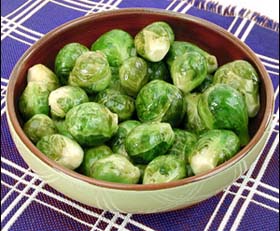|
Research shows that
our expectations can affect the taste of what we eat.
by Virginia Hughes

Not a fan
of Brussel sprouts? New research shows that our expectations
may be able to change the way food tastes to us.
|
|
We often speak of unpopular foods like
Brussel sprouts or chopped liver as being acquired tastes. Now,
brain research from the University of Wisconsin shows just how subjective
our tastes really are. The study, published in the March 2006 issue
of Nature Neuroscience, found that people could not only
be duped into believing a bitter beverage tastes better than it
actually does, but that the trick decreases the activity in the
"taste" region of the brain. The findings also show that this taste
region may be larger than previously thought.
In past research, brain scans performed on Old World monkeys showed that the taste region of their brain, called the primary taste cortex, always gave the same response to a specific taste, regardless of how hungry the monkeys were when they tasted it. This suggested that the primary taste cortex codes for the objective qualities of taste. But many human experiments-like clinical trials where patients felt less pain after taking a placebo-confirmed that in other senses, our expectations could change our perceptions.
Neuroscientist Jack Nitschke and his
colleagues wanted to find out if our sense of taste could be similarly
manipulated. The researchers placed college students under a brain
scanner, and measured brain activity as the subjects rated five
different tastes: very bitter, bitter, neutral, pleasant, and very
pleasant. The bitter tastes were made from quinine-the chemical
that gives tonic water its bite-while the pleasant tastes were different
concentrations of sugar water.
Each trial began with a visual cue-a plus sign, for instance, before the very pleasant taste-so that the subjects knew what taste to expect. But on some trials, the researchers played a game of switcheroo, showing the "bitter" cue before doling out a "very bitter" sample. The trick worked: when subjects were misled to believe the sample would taste better, they rated it higher. Moreover, the subjects didn't realize they had been fooled. "We asked them afterwards," Nitschke says, "and not a single one knew."
 Credit: Greg Dixon
Credit: Greg Dixon
The primary
taste cortex area of the brain can be tricked depending
on expectations of what something will taste like.
|
The brain scan results told the same story. Normally, the more bitter a taste, the larger the response in the primary taste cortex. Indeed, when subjects were given a "very bitter" cue followed by a "very bitter" taste, their brains were highly activated. But when the subjects were given the same "very bitter" taste with a cue that made them think it would taste better, the primary taste cortex gave a much lower response. As Nitschke explains, "their brains just didn't register how awful that taste was."
These results show that taste is a subjective experience that depends on context. And though this "suggestibility effect" has been studied a great deal in other senses like vision, sound, and pain, Nitschke's study is the first to find it in taste.
This work has also brought into question the size of the brain's taste region. In previous work on Old World monkeys, the primary taste cortex was confined to a very small area deep within the brain. "So we were really surprised," Nitschke says, "because what we saw here was this huge area of activation". This shows that the primary taste cortex in humans is larger and more extensive than it is in monkeys.
Neuroscientist Dana Small of Yale University says the study is solid and interesting, and demonstrates the power of belief over sensory experience. But Small says parents have long known about the phenomena. "My mother used to try to get me to eat peas by calling them pea candies," she recalls, "and it worked - at least for awhile."
For more information:
Science Daily - Great (Taste) Expectations: Study Shows Brain Anticipates Taste, Shifts Gears
http://www.sciencedaily.com/releases/2006/02/060222092622.htm
Nitschke Laboratory
http://www.waisman.wisc.edu/nitschkelab/home.htm
|
